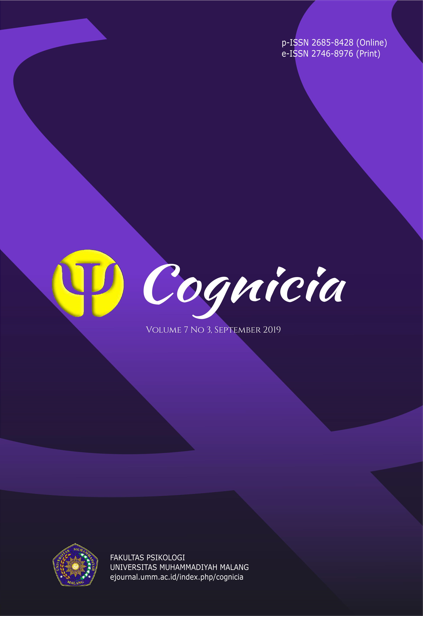Pengaruh optimisme dan kesadaran diri terhadap adversity quotient mahasiswa skripsi sambil bekerja
DOI:
https://doi.org/10.22219/cognicia.v7i3.9013Keywords:
adversity quotient, kesadaran diri, optimismeAbstract
Penelitian ini bertujuan untuk mengetahui pengaruh optimisme dan kesadaran diri terhadap adversity quotient mahasiswa Universitas Negeri Malang yang sedang menempuh skripsi sambil bekerja. Penelitian dilakukan di Universitas Negeri Malang, dengan subjek 88 mahasiswa. Subjek dipilih menggunakan teknik purposive sampling. Alat mengumpulan data berupa skala optimisme, kesadaran diri dan adversity quotient. Skala optimisme terdiri dari 16 item valid dengan reliabilitas 0,813 skala kesadaran diri terdiri dari 21 item valid dengan reliabilitas 0,907 dan skala adversity quotient terdiri dari 38 item valid dengan reliabilitas 0,905. Model regresi berganda dengan bantuan IBMSPSS statistic 20 digunakan sebagai teknik untuk menganalisa data. Hasil dari uji regresi menunjukan nilai signifikansi sebesar 0,000 yang menjelaskan terdapat pengaruh optimisme dan kesadaran diri secara bersamaan terhadap adversity quotient pada mahasiswa Universitas Negeri Malang yang Menempuh skripsi sambil bekerja sebesar 54,3 % sedangkan sisanya dapat dipengaruhi variabel lain. Secara parsial optimisme memiliki pengaruh yang signifikan terhadap adversity quotient. Begitu juga pada variabel kesadaran diri secara parsial memiliki pengaruh yang signifikan terhadap adversity quotient.
Downloads
References
Arikunto. (2010). Prosedur penelitian suatu pendekatan praktik. Jakarta: Rineka Cipta. Carver, S. (1975). Physical Aggression as a Function of Objektive Self-Awareness and Attitudes Toward Punishment. Journal of Experimental Social Psychology, 11, 510–519. Daniel. (2013). 360.000 Sarjana di Indonesia Masih Menganggur. DetikFinance. Retrieved from https://finance.detik.com/berita-ekonomi-bisnis/d-2259348/360000-sarjana-di-indonesia-masih-menganggur Departemen Pendidikan Nasional. (2012). Kamus Besar Bahasa Indonesia Pusat Bahasa Edisi Keempat (keempat). Jakarta: Gramedia Pustaka Umum. Dudija, N. (2012). Perbedaan Motivasi Menyelesaikan Skripsi Antara Mahasiswa Yang Bekerja Dengan Mahasiswa Yang Tidak Bekerja. HUMANITAS: Indonesian Psychological Journal, 8(2), 195–206. https://doi.org/10.26555/HUMANITAS.V8I2.464 Goleman, D. (2005). Working with emotional intelligence : Kecerdasan emosi untuk mencapai puncak prestasi. Jakarta: Gramedia Pustaka Umum. Goleman, D. (2007). Kecerdasan emosional : Mengapa EI lebih penting daripada IQ. Terjemahan. Gramedia Pustaka Umum. Isiya Bekti Utami, Hardjono, & Nugraha ArifKaryanta. (2014). Hubungan antara optimisme dengan adversity quotient pada mahasiswa Program Studi Psikologi Fakultas Kedokteran UNS yang mengerjakan skripsi. Jurnal Ilmiah Psikologi Candrajiwa, 2(5), 154–167. King, J. E. (2003). Nontraditional Attendance and Persistence: The Cost of Students’ Choices. New Directions for Higher Education, 2003(121), 69–83. https://doi.org/10.1002/he.102 Kurniawan, S., Priyatama, A. N., & Karyanta, N. A. (2015). Hubungan konsep diri dengan optimisme dalam menyelesaikan skripsi pada mahasiswa prodi psikologi fakultas kedokteran UNS. Jurnal Ilmiah Psikologi Candrajiwa, 3, 275–285. Laura & Sanjoyo. (2009). Pengaruh Adversity Quotient terhadap kinerja karyawan: sebuah studi kasus pada Holiday Inn Bandung. Universitas Kristen Maranatha. Meer D.V, Peter & Wielers, R. (2015). The Increased Labour Market Participation of Dutch Student. Work, Employment and Society, 15(1), 055–071. Nur, M., Zain, M. Y., & Fattah, S. (2016). Pengangguran Terdidik di Provinsi Sulawesi Selatan. Jurnal Analisis, 5(1), 29–33. Priyatno, D. (2011). Buku Saku SPSS Analisa Statistik Data Lebih Cepat, Efisien, dan Akurat. Yogyakarta: Mediakom. Rachmawati E, Y. (2012). Hubungan Antara Self Efficacy dengan Kematangan Karir Pada Mahasiswa Tingkat Awal dan Tingkat Akhir di Universitas Surabaya. Calyptra: Jurnal Ilmiah Mahasiswa Universitas Surabaya, 1(1), 1–10. Robert, P., & Saar, E. (2012). Learning and working: The impact of the “double status position” on the labour market entry process of graduates in CEE countries. European Sociological Review, 28(6), 742–754. https://doi.org/10.1093/esr/jcr091 Segerstrom, S. C., Carver, C. S., & Scheier, M. F. (2017). Optimism. The Happy Mind: Cognitive Contributions to Well-Being, 30, 195–212. https://doi.org/10.1007/978-3-319-58763-9_11 Seligman, M. E. . (2008). Menginstal optimisme. Bandung: Momentum. Stoltz. (2004). Adversity Quotient: Mengubah hambatan menjadi peluang. Jakarta. Ulfah H, S. (2010). efikasi diri mahasiswa yang bekerja pada saat penyususnan skripsi. Universitas Muhammadiyah Surakarta. Ummah, rifatul anis. (2014). Ketenagakerjaan Paling Krusial di Indonesia. Investordaily. Retrieved from https://investor.id/archive/ketenagakerjaan-masalah-paling-krusial-indonesia Zakaria, D. (2017). Tingkat stres mahasiswa ketika menempuh skripsi skripsi. Universitas Muhamadiyah Malang.
Downloads
Published
How to Cite
Issue
Section
License
Copyright (c) 2019 Sabila Okta Syarafina, Duta Nurdibyanandaru, Wiwin Hendriani

This work is licensed under a Creative Commons Attribution-ShareAlike 4.0 International License.
Authors who publish with Jurnal Cognicia agree to the following terms:
- For all articles published in Jurnal Cognicia, copyright is retained by the authors. Authors give permission to the publisher to announce the work with conditions. When the manuscript is accepted for publication, the authors agree to automatic transfer of the publishing right to the publisher.
- Authors retain copyright and grant the journal right of first publication with the work simultaneously licensed under a Creative Commons Attribution-ShareAlike 4.0 International License that allows others to share the work with an acknowledgment of the work's authorship and initial publication in this journal.
- Authors are able to enter into separate, additional contractual arrangements for the non-exclusive distribution of the journal's published version of the work (e.g., post it to an institutional repository or publish it in a book), with an acknowledgment of its initial publication in this journal.
- Authors are permitted and encouraged to post their work online (e.g., in institutional repositories or on their website) prior to and during the submission process, as it can lead to productive exchanges, as well as earlier and greater citation of published wor (See The Effect of Open Access).

This work is licensed under a Creative Commons Attribution-ShareAlike 4.0 International License







